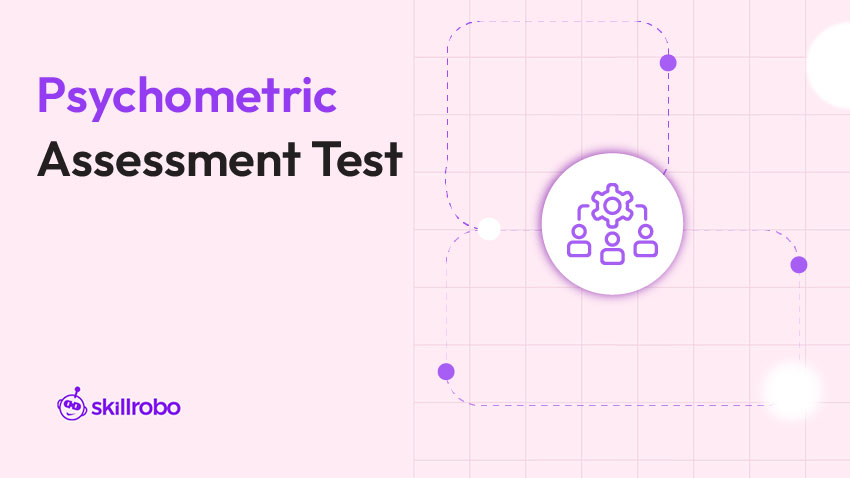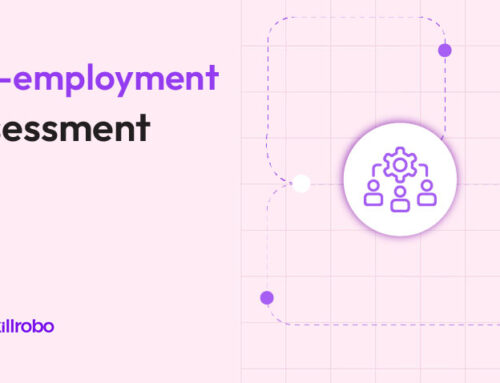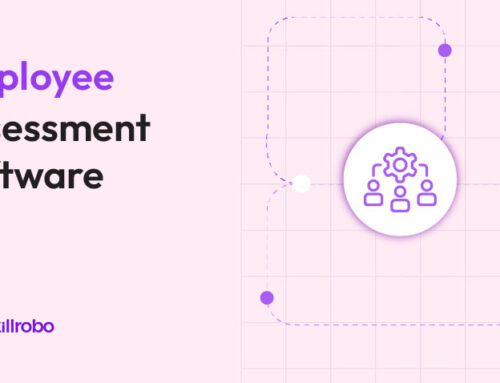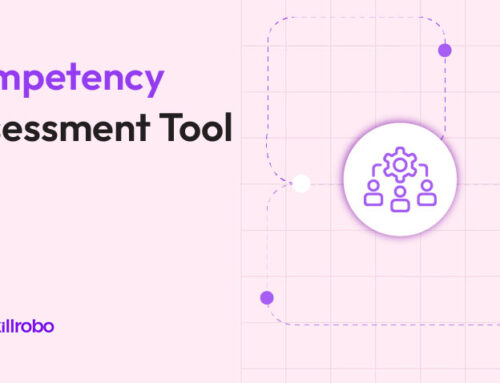Table of Contents
- Key Takeaways
- Why Do You Need Psychometric Tests?
- What do Psychometric Tests Measure?
- Types of Psychometric Assessments
- How Accurate Are Psychometric Tests?
- Psychometric Assessment Methods
- Advantages of Psychometric Assessment Tests
- Emerging Trends in Psychometric Testing
- Conclusion
- Frequently Asked Questions
Related articles

Key Takeaways
-
Psychometric tests enable data-driven hiring by evaluating a candidate’s cognitive abilities, personality traits, and behavior objectively and efficiently.
-
These tests help hiring teams shortlist the top 5–10% of applicants who demonstrate the highest potential and alignment with the job role.
-
Common types of psychometric tests include numerical, verbal, logical, abstract, and situational judgment assessments, each tailored to evaluate specific skill sets.
- Skillrobo’s AI-powered platform offers customizable, job-specific psychometric tests, helping organizations make smarter, faster, and more inclusive hiring decisions.
Why Do You Need Psychometric Tests?
Hiring teams need to handle an extremely high number of applications for any one role. Conventional hiring methods are not capable of handling such high volumes of applications. Psychometric tests are a great tool to shortlist the applicant pool. There is a strong correlation between test scores and job performance. If you score highly on a psychometric test, the chances of performing well in the job are correspondingly high. The psychometric assessment test has proven to be effective in the recruitment and education domains. They have been integrated into pre-employment assessments owing to their effectiveness in the hiring process. These tests enable employers to siphon out the top 5-10% of candidates, who have displayed that they possess key transferable skills. The use of these evaluations accelerates the hiring process and provides a logical candidate shortlist of manageable length, reducing HR costs.
An online psychometric test is considered a reliable indicator of candidate potential and suitability. There is a strong correlation between a high score and subsequent high-quality performance in the role that has been identified. Verbal and numerical reasoning tests are most popular among employers, as they test the comprehension and arithmetic skills of candidates. The tests of accuracy under pressure indicate how candidates will cope in a demanding role.
Psychometric tests bring objectivity back into the recruitment process and prepare the hiring team to handle any surprises. Psychometric evaluations allow the hiring team to make data-driven hiring decisions. A psychometric assessment allows the hiring team to measure things that you couldn’t otherwise detect. A psychometric assessment also allows the recruitment team to compare several candidates simultaneously.
What do Psychometric Tests Measure?
Psychometric tests can measure a wider variety of skills, aptitudes, and traits, like the ones mentioned above. The skills/traits that these tests can measure can be categorized into cognitive abilities and personal characteristics. Taking a psychometric test online can provide deeper insights into the personality and behavior traits of potential hires. Let us look into each of these categories –
1. Cognitive abilities – The cognitive abilities of candidates help measure the intelligence, aptitude, and skills of potential hires.
2. Intelligence – Psychometric tests can measure intelligence in several forms: logical reasoning, spatial thinking, mechanical reasoning, emotional and social intelligence, introspection, and more.
3. Aptitude – Psychometric assessments allow the hiring teams to evaluate the capabilities of candidates and their ability to learn new skills.
4. Skills – You can also assess specific requirements that are strictly related to the job, and related experience and knowledge. Broader skills such as communication and teamwork, can be evaluated in these evaluations.
5. Personal traits – Psychometric tests also help measure personality traits, behavior, and motivation. The attitude, behavior, values, and motivation factors of potential hires are evaluated here.
6. Attitudes – You can evaluate the attitude of the candidate towards other people, new and unfamiliar situations, and work challenges.
7. Behavior – Personality evaluations help evaluate and predict the behavior of the candidate under specific circumstances that are encountered in the role for which they are being considered.
8. Values – Values related to work culture are evaluated here. Measurement of these values informs a person’s attitude and behavior at work and in general.
9. Motivation – Different people have different motivators. These motivations could be around their work choices or willingness to excel.
In addition to the above, psychometric tests can be used in a medical context to assess someone’s mental health status. Personality tests cannot be used as a standalone assessment tool, but rather should be used as part of a carefully defined strategy that considers company culture, team cohesion, and diversity.
Types of Psychometric Assessments
The main types of psychometric tests are broadly categorized into ability tests and personality questionnaires. The most common types of psychometric tests that hiring teams use are numerical reasoning and verbal reasoning. Personality tests explore your interests, values, and motivations, and help analyze how your character fits with the role and organization.
Aptitude tests, on the other hand, assess the reasoning or cognitive ability to determine if you have the right skill set for the role. Let us delve deeper into each type of psychometric assessment.
1. Numerical reasoning
Numerical reasoning tests demonstrate the candidate’s ability to work with numbers quickly and accurately. The questions in numerical reasoning do not test high-level ability, but your capacity to use simple mathematical concepts to analyze data and draw conclusions. Numerical reasoning evaluates your knowledge of ratios, percentages, number sequences, data interpretation, currency conversion, and financial analysis.
2. Mechanical reasoning
Mechanical reasoning tests challenge your understanding and application of mechanical concepts. You need to deduce the elements at work in a particular scenario and answer directly related questions. These questions are usually specific to the sector, they require an element of background knowledge and experience. Common topics that are included in mechanical reasoning evaluations are forces, energy, electricity, and gears.
3. Logical reasoning
The logical reasoning evaluation is made up of non-verbal reasoning tests that assess your ability to interpret shapes, numbers, and patterns. One common type of questioning is to identify the next figure in the sequence from a selection of possibilities. These tests commonly include elements from diagrammatic and numerical reasoning assessments.
4. Verbal reasoning
These tests evaluate the comprehension and interpretation of skills through written passages. A short text passage is provided for review, and candidates are then asked questions relating to its content. The candidate is typically presented with a series of statements that make certain inferences that the candidate is required to deduce. A set of “true”, “false”, or “Cannot Say” options is presented to the candidate to choose the response from.
5. Diagrammatic reasoning
Diagrammatic tests involve the analysis of sequences of shapes and patterns that test pure logical reasoning. Candidates will have to identify the rule that connects the shapes and patterns to identify the next element from a provided selection or to correctly apply the rule to a new scenario.
6. Abstract reasoning
These tests measure the ability to deduce the relationships between shapes and within patterns. They do not involve numerical or verbal analysis; they rather test logical and lateral thinking capabilities, along with your accuracy and speed.
7. Spatial reasoning
The spatial reasoning or awareness test is used to evaluate the ability to identify patterns, visualize movements, and mentally manipulate 2D or 3D objects. Common questions in spatial reasoning include identifying which image is a rotation of a given shape and which corresponds to a certain 3D image.
8. Situational judgment awareness
Situational judgment tests are used to assess the approach towards different situations that arise in the workplace. Your response to a series of hypothetical scenarios at work helps employers judge whether your behavior and attitude align with the company’s expectations and ethos.
How Accurate Are Psychometric Tests?
The answer to this question, in short, is – it is subjective. Psychometric assessment tests can be pretty accurate when qualified professionals design and administer the tests. The best psychometric test for any role is the one that is aligned with the skill and capability requirements of the role. It is important to use proper tests for the role and provide applicants with enough context. This way, you increase the chances of getting honest answers and ensuring a positive candidate experience.
Psychometric tests are not 100% accurate, and they aren’t meant to be that way. Psychometric assessment tests are not intended to be 100% accurate, they are rather an indicator of the alignment of the candidate for the role for which they are being considered. They are not a means to predict future job performance as they are related to overarching qualities and abilities, rather than to specific skills and domains of expertise. These tests must be considered as a comprehensive approach to hiring, together with structured interviews and other skill assessments.
Psychometric tests must inform the decision-making process, not replace it! For example, if someone is highly conscientious, an extraverted, and creative, this does not necessarily mean that they’re a good fit for the role of a marketing director. While the psychometric tests provide additional data and help hiring teams better grasp the candidate’s strengths, they are only as good as the information you feed them, by way of answers provided by candidates.
Another point to be considered is that candidates could influence the results in their favor. For instance, candidates could provide answers in line with what they believe you’d expect to see. This is especially true for personality tests. For highly competitive tests, candidates will probably come prepared and try to paint a more favorable picture of themselves, especially for personality tests.
The results of cognitive tests, however, are relatively difficult to influence, but with the right training and practice, applicants could still perform better than they would otherwise. This is not a bad thing, but someone highly motivated and driven to succeed would demonstrate the same level of determination to do well in the job. This is the case with candidate resumes as well, 85% of the recruiters agree that candidates exaggerate their skills and competencies on their resumes.
Psychometric Assessment Methods
The assessment methods in psychometric tests can be categorized into 3 categories – Observational methods, projective techniques, and personality inventories.
1. Observation method
This type of assessment leans towards watching what people do. This is a research method carried out in psychology. There are different types of observational methods, which include controlled observations, naturalistic observations, and participant observations. In controlled observations, the researcher decides where the observation will take place, at what time, and in what circumstances. The observation is carried out via standardized procedures.
Naturalistic observation involves observing the spontaneous behavior of participants in their natural surroundings. The researcher simply records what they see in the way they can. Participant observation is a variant of the natural observation method where the researcher joins in and becomes a part of the group they are studying to get deeper insight into their lives.
2. Projective technique
This includes personality assessments that offer responses to ambiguous scenes, words, or images. The most commonly followed projective assessment is the Rorschach inkblot test, which involves using inkblots to analyze a person’s personality and emotional functioning. This test was originally developed as a tool to help diagnose schizophrenia.
3. Personality inventories
These are self-assessment tools that career counselors and hiring managers can use to reveal the personality types of participants. These tests provide information about social traits, motivations, strengths, weaknesses, and attitudes. Several career experts believe that these factors play an important role in job and career success and satisfaction.
Popular types of personality tests include the Myers-Briggs Type Indicator, the Caliper Profile, the Predictive Index, and the Sixteen Personality Factor Questionnaire.
Advantages of Psychometric Assessment Tests
Psychometric tests have several advantages that make them excellent hiring tools. Let us take a look at the main advantages of including a psychometric assessment in the hiring process.
1- Enables informed hiring decisions –
A hiring process that is based on data-driven hiring decisions is a solid one that ensures that the hired candidate is a perfect fit in terms of skills, competencies, and aptitude. Psychometric tests can help you complete the picture you have of each candidate with holistic data.
2- Accelerates the hiring process –
Psychometric tests weed out candidates who do not fit the role quickly and efficiently. Administering the proper tests helps hiring teams instantly see whether someone has the right set of cognitive abilities and personality traits for the role. These tests let you optimize resources by focusing only on your best candidates and shortening the time-to-hire.
3- Provides a clear overview of each candidate’s capabilities –
The results of psychometric tests provide in-depth information on each applicant’s performance potential, cognitive abilities, and personality. Psychometric tests help you analyze each applicant’s profile to see how someone would fit in a role.
4- Allows hiring teams to measure things that couldn’t be detected otherwise-
Conventional evaluations are not capable of detecting the cognitive ability and personality traits of candidates. When the right set of psychometric tests is used as part of the hiring strategy, the understanding of each applicant’s capabilities can be drastically improved.
5- Let’s you compare multiple candidates at a glance –
Psychometric tests let you analyze multiple candidate profiles at once and compare them. These tests allow you to gather large volumes of data and see how everyone scores for various traits and cognitive skills for detecting the best candidates and disqualifying the others.
6- Promotes diversity and inclusivity –
Using psychometric tests helps reduce the extent to which your instincts influence the hiring decision. These tests allow you to objectively assess candidates and hire a diverse workforce from all paths of life.
Emerging Trends in Psychometric Testing
Before signing off, let us look at the futuristic trends of psychometric tests and their potential impact on the hiring process, employee engagement, and other aspects of hiring.
Increased integration with Artificial Intelligence and Machine Learning – One of the groundbreaking new developments in the field of psychometric assessments is the increased integration of AI and Machine learning.
Improved customization and personalization – Psychometric tests are expected to witness a significant surge in the trend towards customization and personalization.
Better accessibility and user-friendliness – Psychometric assessments are known for being complex and hard to utilize. Advancements in technology can help create more user-friendly and accessible tools.
Conclusion
The psychometric assessment market has witnessed substantial growth in recent years, owing to an increasing number of hiring managers looking to eliminate bias from the hiring process. A survey by the Times of India reveals that psychometric assessment tests have enabled recruiters and managers to evaluate the capacity of a candidate and determine if the candidate is perfectly suited for the role.
A pre-employment assessment tool like Skillrobo provides psychometric tests for various roles across industries. This AI-powered candidate assessment platform simplifies psychometric assessments greatly. Make the right decision when it comes to choosing the psychometric assessment test. Choose Skillrobo for a seamless hiring experience.
Ready to hire smarter and faster?
Sign up with Skillrobo today and experience the power of AI-driven psychometric assessments for building stronger, more capable teams.
Frequently Asked Questions
1. What is a Psychometric Assessment Test?
A psychometric assessment test measures an individual’s cognitive abilities, personality traits, behavioral styles, and intelligence. These tests are widely used in hiring, education, and career counseling to match candidates to suitable roles.
2. Why are psychometric tests important in hiring?
Psychometric tests add objectivity to the hiring process by evaluating skills and traits that interviews alone can’t assess. They help employers make data-driven decisions, reduce bias, and improve hiring outcomes by identifying the best-fit candidates.
3. What skills do psychometric tests measure?
Psychometric tests assess cognitive abilities (like reasoning, problem-solving, and intelligence) and personal characteristics (such as motivation, behavior, and values), offering a holistic view of a candidate’s potential.
4. Are psychometric tests 100% accurate?
No, psychometric tests are not fully accurate and should not be the sole basis for hiring decisions. They provide useful insights into a candidate’s strengths and weaknesses, but must be combined with interviews and other assessments.
5. How does Skillrobo simplify psychometric assessments?
Skillrobo offers AI-powered psychometric tests that are easy to customize, user-friendly, and designed to streamline the hiring process. It helps recruiters quickly identify top candidates based on reliable data-driven insights.

Key Takeaways
-
Psychometric tests enable data-driven hiring by evaluating a candidate’s cognitive abilities, personality traits, and behavior objectively and efficiently.
-
These tests help hiring teams shortlist the top 5–10% of applicants who demonstrate the highest potential and alignment with the job role.
-
Common types of psychometric tests include numerical, verbal, logical, abstract, and situational judgment assessments, each tailored to evaluate specific skill sets.
- Skillrobo’s AI-powered platform offers customizable, job-specific psychometric tests, helping organizations make smarter, faster, and more inclusive hiring decisions.
Why Do You Need Psychometric Tests?
Hiring teams need to handle an extremely high number of applications for any one role. Conventional hiring methods are not capable of handling such high volumes of applications. Psychometric tests are a great tool to shortlist the applicant pool. There is a strong correlation between test scores and job performance. If you score highly on a psychometric test, the chances of performing well in the job are correspondingly high. The psychometric assessment test has proven to be effective in the recruitment and education domains. They have been integrated into pre-employment assessments owing to their effectiveness in the hiring process. These tests enable employers to siphon out the top 5-10% of candidates, who have displayed that they possess key transferable skills. The use of these evaluations accelerates the hiring process and provides a logical candidate shortlist of manageable length, reducing HR costs.
An online psychometric test is considered a reliable indicator of candidate potential and suitability. There is a strong correlation between a high score and subsequent high-quality performance in the role that has been identified. Verbal and numerical reasoning tests are most popular among employers, as they test the comprehension and arithmetic skills of candidates. The tests of accuracy under pressure indicate how candidates will cope in a demanding role.
Psychometric tests bring objectivity back into the recruitment process and prepare the hiring team to handle any surprises. Psychometric evaluations allow the hiring team to make data-driven hiring decisions. A psychometric assessment allows the hiring team to measure things that you couldn’t otherwise detect. A psychometric assessment also allows the recruitment team to compare several candidates simultaneously.
What do Psychometric Tests Measure?
Psychometric tests can measure a wider variety of skills, aptitudes, and traits, like the ones mentioned above. The skills/traits that these tests can measure can be categorized into cognitive abilities and personal characteristics. Taking a psychometric test online can provide deeper insights into the personality and behavior traits of potential hires. Let us look into each of these categories –
1. Cognitive abilities – The cognitive abilities of candidates help measure the intelligence, aptitude, and skills of potential hires.
2. Intelligence – Psychometric tests can measure intelligence in several forms: logical reasoning, spatial thinking, mechanical reasoning, emotional and social intelligence, introspection, and more.
3. Aptitude – Psychometric assessments allow the hiring teams to evaluate the capabilities of candidates and their ability to learn new skills.
4. Skills – You can also assess specific requirements that are strictly related to the job, and related experience and knowledge. Broader skills such as communication and teamwork, can be evaluated in these evaluations.
5. Personal traits – Psychometric tests also help measure personality traits, behavior, and motivation. The attitude, behavior, values, and motivation factors of potential hires are evaluated here.
6. Attitudes – You can evaluate the attitude of the candidate towards other people, new and unfamiliar situations, and work challenges.
7. Behavior – Personality evaluations help evaluate and predict the behavior of the candidate under specific circumstances that are encountered in the role for which they are being considered.
8. Values – Values related to work culture are evaluated here. Measurement of these values informs a person’s attitude and behavior at work and in general.
9. Motivation – Different people have different motivators. These motivations could be around their work choices or willingness to excel.
In addition to the above, psychometric tests can be used in a medical context to assess someone’s mental health status. Personality tests cannot be used as a standalone assessment tool, but rather should be used as part of a carefully defined strategy that considers company culture, team cohesion, and diversity.
Types of Psychometric Assessments
The main types of psychometric tests are broadly categorized into ability tests and personality questionnaires. The most common types of psychometric tests that hiring teams use are numerical reasoning and verbal reasoning. Personality tests explore your interests, values, and motivations, and help analyze how your character fits with the role and organization.
Aptitude tests, on the other hand, assess the reasoning or cognitive ability to determine if you have the right skill set for the role. Let us delve deeper into each type of psychometric assessment.
1. Numerical reasoning
Numerical reasoning tests demonstrate the candidate’s ability to work with numbers quickly and accurately. The questions in numerical reasoning do not test high-level ability, but your capacity to use simple mathematical concepts to analyze data and draw conclusions. Numerical reasoning evaluates your knowledge of ratios, percentages, number sequences, data interpretation, currency conversion, and financial analysis.
2. Mechanical reasoning
Mechanical reasoning tests challenge your understanding and application of mechanical concepts. You need to deduce the elements at work in a particular scenario and answer directly related questions. These questions are usually specific to the sector, they require an element of background knowledge and experience. Common topics that are included in mechanical reasoning evaluations are forces, energy, electricity, and gears.
3. Logical reasoning
The logical reasoning evaluation is made up of non-verbal reasoning tests that assess your ability to interpret shapes, numbers, and patterns. One common type of questioning is to identify the next figure in the sequence from a selection of possibilities. These tests commonly include elements from diagrammatic and numerical reasoning assessments.
4. Verbal reasoning
These tests evaluate the comprehension and interpretation of skills through written passages. A short text passage is provided for review, and candidates are then asked questions relating to its content. The candidate is typically presented with a series of statements that make certain inferences that the candidate is required to deduce. A set of “true”, “false”, or “Cannot Say” options is presented to the candidate to choose the response from.
5. Diagrammatic reasoning
Diagrammatic tests involve the analysis of sequences of shapes and patterns that test pure logical reasoning. Candidates will have to identify the rule that connects the shapes and patterns to identify the next element from a provided selection or to correctly apply the rule to a new scenario.
6. Abstract reasoning
These tests measure the ability to deduce the relationships between shapes and within patterns. They do not involve numerical or verbal analysis; they rather test logical and lateral thinking capabilities, along with your accuracy and speed.
7. Spatial reasoning
The spatial reasoning or awareness test is used to evaluate the ability to identify patterns, visualize movements, and mentally manipulate 2D or 3D objects. Common questions in spatial reasoning include identifying which image is a rotation of a given shape and which corresponds to a certain 3D image.
8. Situational judgment awareness
Situational judgment tests are used to assess the approach towards different situations that arise in the workplace. Your response to a series of hypothetical scenarios at work helps employers judge whether your behavior and attitude align with the company’s expectations and ethos.
How Accurate Are Psychometric Tests?
The answer to this question, in short, is – it is subjective. Psychometric assessment tests can be pretty accurate when qualified professionals design and administer the tests. The best psychometric test for any role is the one that is aligned with the skill and capability requirements of the role. It is important to use proper tests for the role and provide applicants with enough context. This way, you increase the chances of getting honest answers and ensuring a positive candidate experience.
Psychometric tests are not 100% accurate, and they aren’t meant to be that way. Psychometric assessment tests are not intended to be 100% accurate, they are rather an indicator of the alignment of the candidate for the role for which they are being considered. They are not a means to predict future job performance as they are related to overarching qualities and abilities, rather than to specific skills and domains of expertise. These tests must be considered as a comprehensive approach to hiring, together with structured interviews and other skill assessments.
Psychometric tests must inform the decision-making process, not replace it! For example, if someone is highly conscientious, an extraverted, and creative, this does not necessarily mean that they’re a good fit for the role of a marketing director. While the psychometric tests provide additional data and help hiring teams better grasp the candidate’s strengths, they are only as good as the information you feed them, by way of answers provided by candidates.
Another point to be considered is that candidates could influence the results in their favor. For instance, candidates could provide answers in line with what they believe you’d expect to see. This is especially true for personality tests. For highly competitive tests, candidates will probably come prepared and try to paint a more favorable picture of themselves, especially for personality tests.
The results of cognitive tests, however, are relatively difficult to influence, but with the right training and practice, applicants could still perform better than they would otherwise. This is not a bad thing, but someone highly motivated and driven to succeed would demonstrate the same level of determination to do well in the job. This is the case with candidate resumes as well, 85% of the recruiters agree that candidates exaggerate their skills and competencies on their resumes.
Psychometric Assessment Methods
The assessment methods in psychometric tests can be categorized into 3 categories – Observational methods, projective techniques, and personality inventories.
1. Observation method
This type of assessment leans towards watching what people do. This is a research method carried out in psychology. There are different types of observational methods, which include controlled observations, naturalistic observations, and participant observations. In controlled observations, the researcher decides where the observation will take place, at what time, and in what circumstances. The observation is carried out via standardized procedures.
Naturalistic observation involves observing the spontaneous behavior of participants in their natural surroundings. The researcher simply records what they see in the way they can. Participant observation is a variant of the natural observation method where the researcher joins in and becomes a part of the group they are studying to get deeper insight into their lives.
2. Projective technique
This includes personality assessments that offer responses to ambiguous scenes, words, or images. The most commonly followed projective assessment is the Rorschach inkblot test, which involves using inkblots to analyze a person’s personality and emotional functioning. This test was originally developed as a tool to help diagnose schizophrenia.
3. Personality inventories
These are self-assessment tools that career counselors and hiring managers can use to reveal the personality types of participants. These tests provide information about social traits, motivations, strengths, weaknesses, and attitudes. Several career experts believe that these factors play an important role in job and career success and satisfaction.
Popular types of personality tests include the Myers-Briggs Type Indicator, the Caliper Profile, the Predictive Index, and the Sixteen Personality Factor Questionnaire.
Advantages of Psychometric Assessment Tests
Psychometric tests have several advantages that make them excellent hiring tools. Let us take a look at the main advantages of including a psychometric assessment in the hiring process.
1- Enables informed hiring decisions –
A hiring process that is based on data-driven hiring decisions is a solid one that ensures that the hired candidate is a perfect fit in terms of skills, competencies, and aptitude. Psychometric tests can help you complete the picture you have of each candidate with holistic data.
2- Accelerates the hiring process –
Psychometric tests weed out candidates who do not fit the role quickly and efficiently. Administering the proper tests helps hiring teams instantly see whether someone has the right set of cognitive abilities and personality traits for the role. These tests let you optimize resources by focusing only on your best candidates and shortening the time-to-hire.
3- Provides a clear overview of each candidate’s capabilities –
The results of psychometric tests provide in-depth information on each applicant’s performance potential, cognitive abilities, and personality. Psychometric tests help you analyze each applicant’s profile to see how someone would fit in a role.
4- Allows hiring teams to measure things that couldn’t be detected otherwise-
Conventional evaluations are not capable of detecting the cognitive ability and personality traits of candidates. When the right set of psychometric tests is used as part of the hiring strategy, the understanding of each applicant’s capabilities can be drastically improved.
5- Let’s you compare multiple candidates at a glance –
Psychometric tests let you analyze multiple candidate profiles at once and compare them. These tests allow you to gather large volumes of data and see how everyone scores for various traits and cognitive skills for detecting the best candidates and disqualifying the others.
6- Promotes diversity and inclusivity –
Using psychometric tests helps reduce the extent to which your instincts influence the hiring decision. These tests allow you to objectively assess candidates and hire a diverse workforce from all paths of life.
Emerging Trends in Psychometric Testing
Before signing off, let us look at the futuristic trends of psychometric tests and their potential impact on the hiring process, employee engagement, and other aspects of hiring.
Increased integration with Artificial Intelligence and Machine Learning – One of the groundbreaking new developments in the field of psychometric assessments is the increased integration of AI and Machine learning.
Improved customization and personalization – Psychometric tests are expected to witness a significant surge in the trend towards customization and personalization.
Better accessibility and user-friendliness – Psychometric assessments are known for being complex and hard to utilize. Advancements in technology can help create more user-friendly and accessible tools.
Conclusion
The psychometric assessment market has witnessed substantial growth in recent years, owing to an increasing number of hiring managers looking to eliminate bias from the hiring process. A survey by the Times of India reveals that psychometric assessment tests have enabled recruiters and managers to evaluate the capacity of a candidate and determine if the candidate is perfectly suited for the role.
A pre-employment assessment tool like Skillrobo provides psychometric tests for various roles across industries. This AI-powered candidate assessment platform simplifies psychometric assessments greatly. Make the right decision when it comes to choosing the psychometric assessment test. Choose Skillrobo for a seamless hiring experience.
Ready to hire smarter and faster?
Sign up with Skillrobo today and experience the power of AI-driven psychometric assessments for building stronger, more capable teams.
Frequently Asked Questions
1. What is a Psychometric Assessment Test?
A psychometric assessment test measures an individual’s cognitive abilities, personality traits, behavioral styles, and intelligence. These tests are widely used in hiring, education, and career counseling to match candidates to suitable roles.
2. Why are psychometric tests important in hiring?
Psychometric tests add objectivity to the hiring process by evaluating skills and traits that interviews alone can’t assess. They help employers make data-driven decisions, reduce bias, and improve hiring outcomes by identifying the best-fit candidates.
3. What skills do psychometric tests measure?
Psychometric tests assess cognitive abilities (like reasoning, problem-solving, and intelligence) and personal characteristics (such as motivation, behavior, and values), offering a holistic view of a candidate’s potential.
4. Are psychometric tests 100% accurate?
No, psychometric tests are not fully accurate and should not be the sole basis for hiring decisions. They provide useful insights into a candidate’s strengths and weaknesses, but must be combined with interviews and other assessments.
5. How does Skillrobo simplify psychometric assessments?
Skillrobo offers AI-powered psychometric tests that are easy to customize, user-friendly, and designed to streamline the hiring process. It helps recruiters quickly identify top candidates based on reliable data-driven insights.










